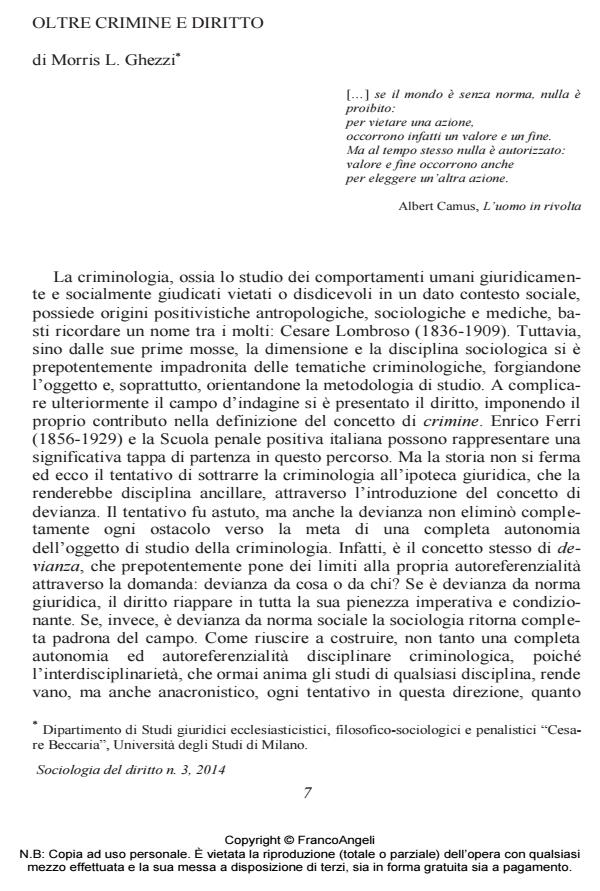Beyond Crime and Law
Journal title SOCIOLOGIA DEL DIRITTO
Author/s Morris L. Ghezzi
Publishing Year 2015 Issue 2014/3 Language Italian
Pages 13 P. 7-19 File size 85 KB
DOI 10.3280/SD2014-003001
DOI is like a bar code for intellectual property: to have more infomation
click here
Below, you can see the article first page
If you want to buy this article in PDF format, you can do it, following the instructions to buy download credits

FrancoAngeli is member of Publishers International Linking Association, Inc (PILA), a not-for-profit association which run the CrossRef service enabling links to and from online scholarly content.
Law tackles the issue of crime and deviance primarily from a standpoint of normativity, while criminology tackles it from that of human behaviour and the power of defining that behaviour. Law is based on a presupposed concept of ought, that derives directly from David Hume’s Great Division between judgements of fact and judgements of values. Law thus emerges from a choice of methodology that presumes free will and produces heteronymous psychological effects. Philosophical debate and today’s social reality have questioned both the freedom of human choices and the usefulness and legitimacy of the heteronomous legal model. Subjectivist individualism has undermined the legitimacy of legal heteronomy in favour of autonomy, while contemporary society is portrayed as increasingly unstable in its normative choices. Pluralism and diversities emerge in contemporary society, highlighting the inability of the current model of law to regulate them sufficiently. Today’s prevailing legal nihilism needs to build a new model of autonomous and no longer heteronomous law. In particular, criminal law should be reduced to merely controlling crimes of violence and the current model of law replaced with a new one, based on spontaneous consensus and the effectiveness of its organisation, certainly not on duty.
Keywords: Nihilism, Pointless law, Law without obligations
- Alimena, Bernardino, 1894. I limiti e i modificatori dell’impunità. Torino: Fratelli Bocca.
- Bauman, Zygmunt, [2000] 2011. Modernità liquida. Tr. it. Roma-Bari: Laterza.
- Frosini, Vittorio, 2001. L’ipotesi robinsoniana e l’individuo come ordinamento giuridico. Sociologia del diritto, 3: 5 ss.
- Irti, Natalino, 2005. Nichilismo giuridico. Roma-Bari: Laterza.
- —, 2007. Il salvagente della forma. Roma-Bari: Laterza.
- —, 2011. Diritto senza verità. Roma-Bari: Laterza.
- Merzagora, Isabella, 2012. Colpevoli si nasce? Criminologia, determinismo, neuroscienze. Milano: Raffaello Cortina.
- Pattaro, Enrico, 2010. Opinio iuris. Lezioni di filosofia del diritto per l’A.A. 2010-2011. Torino: Giappichelli.
- Searle, John, [2004] 2005. Libertà e neurologia. Riflessioni sul libero arbitrio, il linguaggio e il potere, Tr. it. Milano: Bruno Mondadori.
- — , [2010] 2010. Creare il mondo sociale. La struttura della civiltà umana. Tr. it. Milano: Raffaello Cortina.
Morris L. Ghezzi, Oltre crimine e diritto in "SOCIOLOGIA DEL DIRITTO " 3/2014, pp 7-19, DOI: 10.3280/SD2014-003001